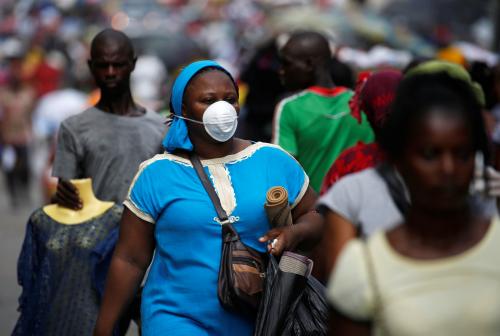On March 17, GeoPoll released the results of their survey deployed to determine perceptions and understanding of COVID-19 in South Africa, Kenya, and Nigeria. South Africa currently has the highest number of diagnosed cases of the virus of any African country, and, while the number of diagnosed cases is currently low in Nigeria and Kenya, both countries are at risk of the virus rapidly spreading through their large populations. In order to provide data to help countries fight the pandemic, the survey examined respondents’ awareness levels, sources of information, knowledge of prevention methods, and levels of worry related the virus.
The survey found that levels of awareness and concern about COVID-19 were high in all three countries. As Figure 1 shows, respondents were most concerned about global infections over local infections or contracting the disease themselves. In addition to the virus’s effect on health, respondents were also concerned about the economy, with 19 percent stating that their primary concern was COVID-19’s economic impact. In Kenya, respondents were more concerned about the financial impact of the virus than in Nigeria and South Africa: A large majority (79 percent) of Kenyans, compared to 57 percent of Nigerians and South Africans, believe that they will be worse off financially as the virus spreads.
Figure 1. Primary concern about COVID-19
 Source: GeoPoll
Source: GeoPoll
GeoPoll states that the spread of misinformation about the virus has been a concern in several countries including Kenya: Social media outlets, such as WhatsApp, have already been used to spread false information about remedies and travel restrictions. As Figure 2 shows, social media was the most common primary source of information about COVID-19 among respondents. Furthermore, 75 percent of respondents—including those for whom social media was not a main source of information—had seen information on WhatsApp regarding COVID-19. The majority of respondents described this information as “somewhat truthful,” suggesting that most respondents were skeptical of the quality of information distributed over WhatsApp.
Figure 2. Main sources of information about COVID-19
 Source: GeoPoll
Source: GeoPoll
Note: Respondents could select more than one primary source of information.
For more analysis of the health and economic effects of COVID-19 in Africa, see “Coronavirus: Amid the global pandemic, lessons for Africa” by Yvonne Mburu and Yap Boum II, and “Strategies for coping with the health and economic effects of the COVID-19 pandemic in Africa” by Brahima Coulibaly and Payce Madden.





Commentary
Figures of the week: Perceptions of COVID-19 in South Africa, Kenya, and Nigeria
April 2, 2020